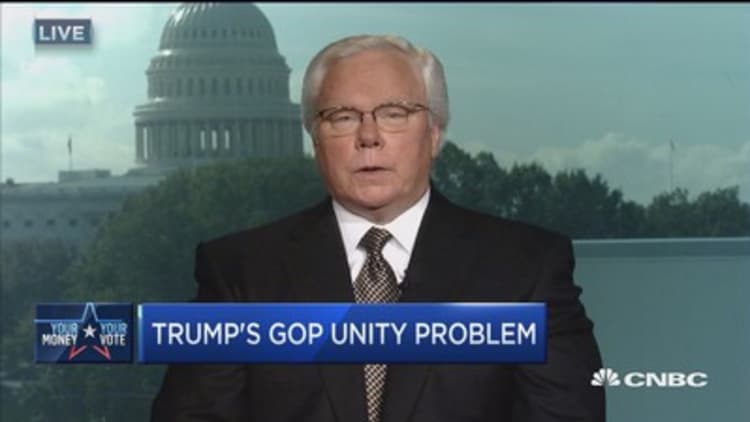
Republican Senate candidates entering a perilous debate season are facing a Donald Trump problem.
While their one-on-one encounters may not draw the massive viewership of the presidential debates, these down-ballot candidates face their own unique pressures on the public stage. A solid, issue-oriented discussion may attract a collective yawn from the voters. But even a small gaffe can come to define the entire election.
And as the debate season kicks into high gear, Trump is creating an added burden for Republican candidates in competitive races.
GOP incumbents have largely been able to avoid getting dragged into the presidential race by controlling their own messages and limiting their exposure to questions about the man at the top of their ticket. It's a tactic they can't rely on in a debate setting where they are certain to be forced to answer a question about the controversial candidate's words, policy positions and behavior.
Even before Trump's nomination became official in July, many of these candidates have had to walk a fine line between harnessing his supporters without turning off segments of voters wary of boarding the Trump train. It's a challenge that's only grown in the past week as the GOP has split over its support for Trump in reaction to his lewd comments about his treatment of women caught on an open mic.
To embrace or not embrace Donald Trump, that is the question.
"Each one is going to have to handle these questions about Trump that could be a minefield," said Ron Bonjean, a veteran GOP strategist.
While it should be relatively easy to respond to direct questions about comments on a leaked videotape of Trump in 2005 in which he described aggressive sexual behavior toward women, the tougher questions, Bonjean said, would be "about their support for him — why or why not."
"Threading the needle between attracting general election voters — while not alienating the Trump base — that's a difficult razor's edge to be on," he said.
More From NBC News:
Yes, politics can be civil
Major GOP donors are asking Trump for their money back
Trump focuses on Wikileaks emails, backs off GOP establishment at Florida rally
It will be particularly difficult, political analyst Larry Sabato said, for those Republican senators in tossup states that are leaning Democratic in the presidential race, like Sen. Pat Toomey in Pennsylvania or Sen. Ron Johnson in Wisconsin, to manage that balancing act.
"Heads you lose, tails you lose. You're going to lose one constituency either way you go," he said.
This week marked the start of Senate debate season in in earnest, with at least six debates in key races on tap, another six scheduled for next week, and a few more up until the week before Election Day.
And some Republican senators have already felt the pain of a tough Trump question on the debate stage.
On Monday night, Arizona Sen. John McCain parried a number of pointed questions from moderators and his opponent, Democratic Rep. Ann Kirkpatrick, about his support for Donald Trump, without any major gaffes. But his pronouncement that he would not be voting for either major party presidential candidate is not without risk.
On Tuesday morning, Trump took aim at the Republican senator in a tweet declaring "the very foul-mouthed John McCain begged for my support during his primary…then dropped me over locker room remarks!" (Trump did indeed endorse McCain, but too late in the primary for it to make much of a difference). McCain holds a solid double-digit lead on Kirkpatrick, but with a much tighter race at the presidential level, the GOP senator can't afford to lose much support from the GOP base.
And as New Hampshire Republican Sen. Kelly Ayotte can attest, a stumble during a debate can haunt a GOP candidate for days or weeks, providing an easy soundbite for Democratic attack ads.
Ayotte was asked during last week's New Hampshire Senate debate whether she would consider Trump to be a role model and tell children to be like him. Her clunky answer — "I believe he can serve as president, and so absolutely I would do that" — immediately went viral, drawing negative headlines and attacks from Democrats.
Ayotte walked the comment back within hours after what, as former New Hampshire Republican Party Chairman Fergus Cullen said, was an anomaly for her campaign.
"Up until that point, she did everything right."
"Until a couple weeks ago," Cullen lamented, "it looked like she had threaded the needle about as good as anyone could with Trump."
But Democrats seized on the moment, blasting it out in campaign ads — the most recent of which, cut this weekend, ties Ayotte's comments on Trump to the 2005 tape of him using lewd words to describe pursuing women without their consent.
Still, Cullen, who opposes Trump and sarcastically answered the phone with a gloomy "New Hampshire suicide hotline," said it wasn't that specific debate moment that would do Ayotte in — there was, in his mind, no helping Republicans now.
"I just fear there's going to be such a downdraft [for Republicans] that there is no riding it out," he said, predicting Democrats could flip the legislature as well as the state's GOP Senate and House seats.
"We'll be paying the price of this election for a long time."

